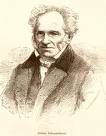Schopenhauer on genius and truth
“The exceptional man is like an archer who can strike a target others cannot, the genius is the one who can strike a target others cannot even see.”
also rendered as:
“Talent hits a target no one else can hit; Genius hits a target no one else can see.”
His other most well known quote:
“All truth passes through three stages. First, it is ridiculed. Second, it is violently opposed. Third, it is accepted as being self-evident.”


I’ll have to print this out and take it to philosophy class! You must have known we would be going over Hegel, Kant, and Schopenhauer this week. :-D
Hope you have some serious fun with these philosophic heavyweights.
Got a kick out of this statement, Ann!
I would revise it to read:
“The exceptional man is like an archer who can strike a target others cannot, the genius or [mentally insane] is [are] the one[s] who can strike a target others cannot even see.”
Btw, have been reading regularly, just have been low on time to comment. Will try to jump back in shortly!
Hope you are well!
-Jack
:) Glad you got a kick out of that quote and how right you are, Jack. Thanks for the reminder that there is a fine line between genius and insanity. Do jump in anytime/ when you are able.
cheers
Ann
Well, Ann, I’m not even close to genius, but I can identify with the latter! HA!
Have a wonderful weekend!
-j
You and me too, dear man. ;) A John Dryden verse for you:
To be fair to Schopenhauer’s astute observation, the evidence has been borne out in modern science that because the brain acts as the crucial interpreter of visual information the eye receives, in an important sense it is the mind that “sees”.
I’m always reminded of the many examples of flashes of inspiration inventors, discoverers, writers and other creative types have had.
A splendid one is chemist Friedrich August Kekule, who, sitting half-asleep, half-dreaming in his chair one night staring into the fireplace, suddenly saw in his mental eye an image that was to lead to his discovery of the chemical structure of benzene in 1864. He saw a serpent eating its own tail in the fire, which led him to correctly identify that benzene took the form of a closed ring.
Another may have looked into the flames and just seen flames, of course. This highlights the role of the intuitive and the unconscious in guiding us towards seeing new vistas.
As Marcel Proust also once said, “The real voyage of discovery consists not in seeking new landscapes but in having new eyes.” (I’ve quoted this gem before, I’m sure, its one of my favourites).
Perhaps this is just a variation of Christ’s wisdom, “Let those who have eyes, see”? Your take on this would be far superior to mine, I’d be interested in your interpretation.
Inspiration to you, and may you also have a lovely weekend.
When we’re young we’re led to believe that the genius is associated with functional intelligence – someone good at math or solving the Rubiks. But later in life we start to see genius at work in all sorts of systems. It’s always derivative and creative and simple. Something needs to be done. The genius sees what needs to be done and does it.
The keepers of useless information we see on Jeopardy want to keep the whole library of facts in their heads instead of at the library. These aren’t examples of genius but of compulsion. The work that they do impresses us, but does it solve solve any actual problems what need solving? Will mankind be saved by the knowing of many things? Is the world running out of useless information? Why are they never there when you’re drinking a beer trying to remember the name of that person who discovered the whatchamacallit?
I myself was a fishing genius at one time. I could always tell where the fish where and when they were hungry because I watched insects disappearing from the surface. Those fish need to be caught, so I catch em. It’s why God put me here.
Tesla comes to mind after reading your comment, Ann.
-Jack
Yes! Good distinction. Trivia may well be more about compulsion than true knowledge, certainly.
Pray tell, why were you a fishing genius once upon a time and not still, dear friend?